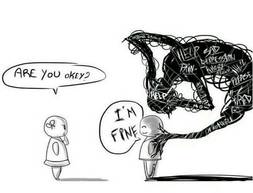 Depression is a state of hopelessness. It is a hopelessness about oneself as much as about the world. When depressed, everything can seem pointless and too much of effort, because one's critical mind mistakenly reasons that everything is doomed, nothing will ever be right and anyway it all falls apart. The brain is in a loop of ever deepening negativity, a whirlpool that sucks the hapless soul into black pits of nothingness. Happy thoughts and motivation struggle to swim against it, and often it is just a sinking feeling. There is a constant loop of negative thoughts, self-defeating beliefs and mood is depressed. Even as we look at depression as a mood and thought disorder, at another level, it is an issue of love and compassion, for both oneself and the world around. Part of depression, when deeper, seems almost like punishing oneself. It is like a dictator has taken over the land, and is ruthlessly putting down every good thing - the hard, critical voice takes over and churns out unloving, uncompassionate messages that sap one's ability to believe in positivity, in people, and the world around them. That difficulty in experiencing self-love and self-compassion erodes esteem and confidence, setting into motion vicious cycles of self erosion. Getting through depression requires attention to defeat these critical beliefs and thoughts at the first level, but it requires something more - it needs us to start being able to love, start to again be compassionate, and as the saying goes love is needed most when it seems to be deserved the least. When our depressed brain tells us we aren't worthy, the world isn't worthy, that's when we need the love the most. In our quest to fight depression, let's be conscious that this isn't a war on depression. No weapons of mass destruction are needed. No aggression. We aren't fighting. We don't need battle armour and sharp, hard objects, or explosives. We need weapons of thought monitoring and whole lot of love and compassion. 1. http://www.thenewsminute.com/article/don-t-jump-judge-why-calling-suicide-cowardly-and-selfish-act-no-help-anyone-59948
2. http://www.newindianexpress.com/cities/bengaluru/2017/apr/07/i-love--met-1591128.html Every fairy tale ends with a happy ever-after message, and in reality, we know that no such thing exists or is possible, or is even desirable. There will always be nature that does something - the flowers wilt, summer gets over, school reopens. Life and death continue their cycles. Making ourselves believe that we should just not heed any such event, and try really hard to satisfy the social pressures to be happy, always and as much as you can, is only doing ourselves a disservice. Sadness associated with losses, either through natural causes or due to errors of judgement, or due to competitive losses, can help us develop better judgement, prepare for future events and motivate us. "One of the primary reasons we have emotions in the first place is to help us evaluate our experiences." - Adler We were given all these emotions because they do give us a real advantage. Being sad over having lost the 100m dash can help us know ourselves better - maybe we will get faster, maybe we will change our sport, maybe next time we'd sit in the rafters and cheer a friend, but we will get through it and learn from it.
Instead of trying to avoid or ignore sadness, a healthier alternative would be to:
Going through the temporary and event-driven sadness, as and when they occur, can be a life-enriching experience, if only we let it. The way to feel better is often through the sadness when it comes, and not around it or to just avoid it. |
InnerSight BloggersAjanta, Mahesh and other InnerSight counsellors and guest contributors are happy to share their thoughts here. Categories
All
Archives
September 2020
|

 RSS Feed
RSS Feed